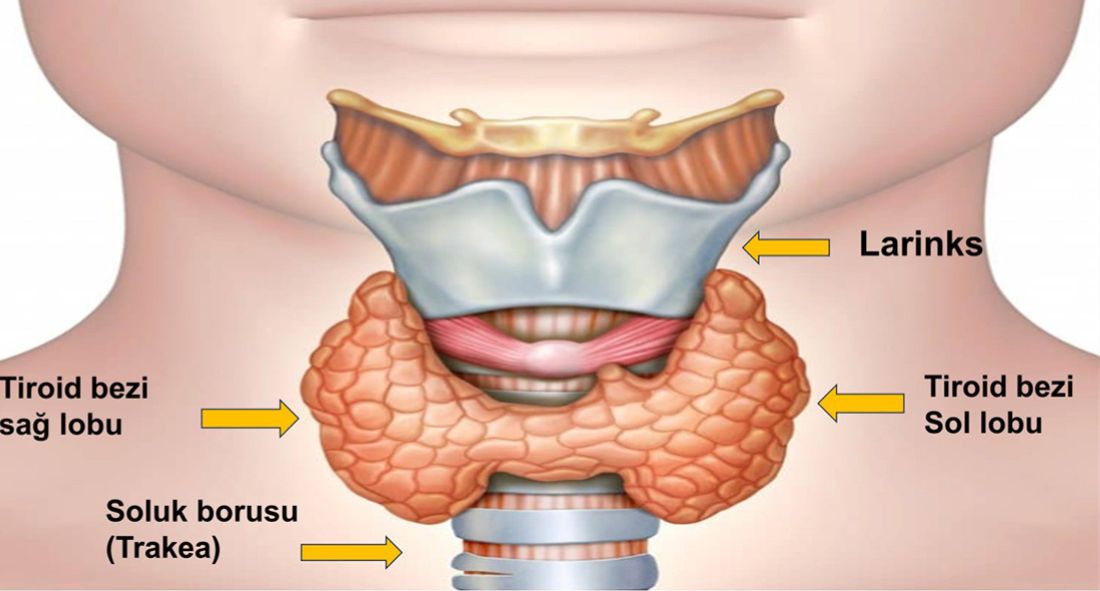What is the Thyroid Gland?
The thyroid gland is a butterfly-shaped endocrine gland located at the lower front of the neck, in front of the trachea. The thyroid gland consists of two parts: the right lobe and the left lobe. The right and left thyroid gland lobes are connected by a thin flap of thyroid parenchyma, called the "isthmus."

The thyroid gland produces certain thyroid hormones, including triiodothyronine (T3) and thyroxine (T4). These hormones are produced by the thyroid gland, released into the bloodstream, and then transported to the body's tissues.
For the thyroid gland to produce thyroid hormones (T3, T4), it needs iodine. The body's daily iodine requirement is typically met through iodized table salt, fish, and some vegetables. Inadequate iodine intake can lead to disruptions in the functioning of the thyroid gland.
The functions of the thyroid gland are regulated by the pituitary gland in the brain. The pituitary gland produces various hormones, including thyroid-stimulating hormone (TSH). TSH stimulates the thyroid gland to produce T3 and T4 hormones. Outside the thyroid gland, T4 hormone in the blood is converted into T3 hormone by the deiodinase enzyme. T3 is the most active form of thyroid hormone in peripheral blood.
Basic tests for evaluating the thyroid gland include thyroid hormone blood tests. These tests are the TSH, T3, and T4 hormone tests.
TSH is the most sensitive hormone for assessing thyroid function. A normal TSH level generally indicates normal thyroid function (Euthyroidism).
Increased TSH with decreased fT3 and fT4 indicates a diagnosis of Hypothyroidism, while decreased TSH with increased fT3 and fT4 indicates a diagnosis of Hyperthyroidism.
Thyroid hormones regulate the metabolic rate by providing energy for the cells in our body. These hormones have important roles, such as regulating body metabolism, controlling body temperature, and helping the brain, heart, muscles, and other organs function properly.
What Does the Thyroid Gland Do?
The thyroid gland generally regulates the body's energy usage (metabolism). The functions for which the thyroid gland is responsible are as follows:
- Heart rate
- Digestive system
- Body temperature
- Brain development and mental activity
- Skin and bone health
- Fertility
Thyroid Gland Diseases
Thyroid gland diseases include the following:
- Hypothyroidism (Underactive thyroid gland)
- Hyperthyroidism (Overactive thyroid gland)
- Goiter (Enlargement of the thyroid gland)
- Thyroid cancer
Thyroid diseases can be briefly described as follows:
Hypothyroidism
The clinical picture of hypothyroidism occurs when the thyroid gland is unable to produce enough hormones and release them into the bloodstream. In hypothyroidism, metabolism significantly slows down due to a lack of thyroid hormones.
Causes of Hypothyroidism
- Hashimoto's thyroiditis and autoimmune diseases
- Thyroiditis (Inflammatory diseases of the thyroid gland)
- Iodine deficiency
- Congenital hypothyroidism (Thyroid gland dysfunction from birth)
- Thyroid surgeries leading to complete or partial removal of the thyroid gland
- Excessive doses of anti-thyroid drugs in hyperthyroidism
Hyperthyroidism
Hyperthyroidism is defined as an overactive thyroid gland. It occurs when the thyroid gland produces and releases more thyroid hormones into the bloodstream than the body needs. As a result, metabolism increases significantly and leads to various clinical symptoms.
Causes of Hyperthyroidism
- Graves' disease (Autoimmune disease)
- Hot thyroid nodules (Hormone-secreting thyroid nodules)
- Postpartum thyroiditis (Thyroid gland inflammation occurring during the postpartum period)
- Pituitary tumor
- Excessive iodine intake
Goiter
Goiter is a condition where the thyroid gland becomes abnormally enlarged. The thyroid glands, located at the top of the trachea in the lower neck, enlarge due to iodine deficiency, Graves' disease, or Hashimoto's disease. This enlargement can cause physical discomfort, along with shortness of breath and coughing, leading to goiter.
Thyroid Cancer
In cases where the thyroid gland enlarges, nodules may form. Some of these nodules, referred to as malignant or cancerous, are diagnosed as thyroid cancer. However, the risk of a nodule turning into thyroid cancer is very low.
For the diagnosis and treatment of thyroid gland diseases, you can consult Interventional Radiology Specialist Associate Prof. Dr. Bülent Çekiç in Antalya Muratpaşa. For appointments, please contact us.
Frequently Asked Questions:
- What are the symptoms of thyroid gland disease?
- What are the symptoms of hyperthyroidism (excessive hormone production by the thyroid)?
- Restlessness
- Anxiety
- Palpitations
- Excessive sweating
- Weight loss
- Diarrhea
- Muscle weakness and pain
- Protrusion of the eyes (Exophthalmos)
- What are the symptoms of hypothyroidism (insufficient thyroid function)?
- Constant, unrelenting fatigue and weakness
- Weight gain
- Hair loss
- Thick and dry skin
- Constant feeling of cold
- Depression
- Infertility
- Loss of libido
- Irregular menstruation
- Increased risk of miscarriage
- Who is more likely to develop thyroid diseases?
- Thyroid diseases are 5-6 times more common in women.
- People with a family history of thyroid disease.
- People over the age of 50.
- People who have had radioactive iodine treatment or thyroid surgery in the past.
- Can thyroid diseases be cured?
Symptoms of thyroid gland disease vary depending on whether the thyroid gland produces too much or too little hormone. Additionally, in patients diagnosed with thyroiditis (inflammation of the thyroid gland), there may be flare-ups and remissions during periods of hyperthyroidism and hypothyroidism.
Thyroid diseases can be treated, and their progression can be managed with proper treatment. If thyroid cancer is diagnosed at an early stage, the disease can be treated, and the survival rate is very high.

 TR
TR

